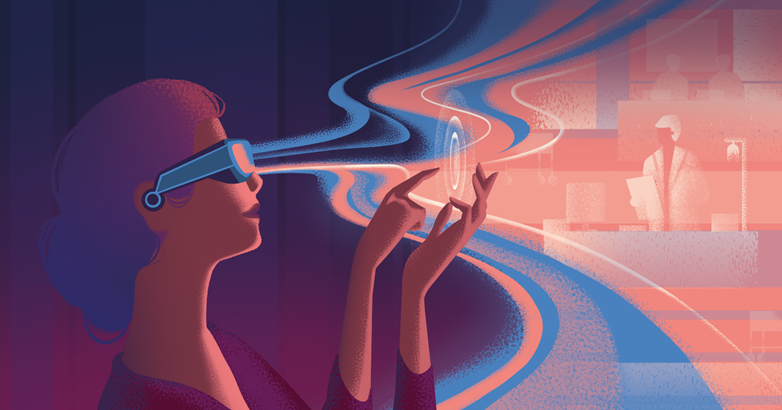Nowadays, virtual reality is revolutionizing modern science and changing our perception of the world. It has become especially popular among children and youngsters willing to plunge into a new marvelous environment, totally different from their surroundings. With the ever-growing digitalization in many spheres of human life, the healthcare industry is gradually adopting VR technology. That is why medical institutions cooperate with healthcare software development companies in search of efficient VR solutions. In this article, we’ll describe the essence and benefits of VR in healthcare.
What is Virtual Reality?
Virtual Reality (VR) is a cutting-edge technology that allows users to fully immerse in a simulated three-dimensional environment. It is mostly used for entertainment purposes, such as video gaming, but also offers vast possibilities in other areas. In certain contexts, VR can be used alongside augmented reality (AR). Despite obvious similarities between VR and AR, these concepts are different. AR offers an enhanced vision of the world whereas VR completely substitutes the real image with an artificial one. It can also affect our smell, touch, or hearing.
To experience VR, one needs special equipment. Once you put on a virtual reality headset and gloves, you are introduced to a world of realistic computer-generated images. Such experience can be truly captivating, but you should always keep in mind that VR overuse can be addictive. Moreover, some people can develop VR sickness.
Benefits of VR in Healthcare
- Teaching and learning.
VR is a helpful tool in teaching medical students and a good way to hone one’s skills. For example, it helps to train young surgeons by streaming operations directly from an operating theatre. A virtual reality camera lets students enter an OR, and they only need a pair of goggles to follow the whole process. Another advantage is cadaver-free studies of human anatomy. VR can even teach nurses to communicate with patients.
- Helping patients to reduce anxiety.
Staying in hospital is an ordeal for many patients disposed to depression, anxiety, or panic attacks. Constant thoughts about your state of health may become burdensome. People with mental disorders are even more fragile and need special care. VR can considerably ease the pain by letting you into a parallel reality full of positive emotions. It is easier to calm down watching beautiful landscapes or exploring the underwater world, etc. Another startling fact is that VR is already used in maternity wards to relieve labour pain.
- VR for medical conferences.
If you combine the academic approach with VR, healthcare and medical conferences will become much more entertaining. It will allow organizers to attract larger audiences and even engage e-patients who may take an active part in designing modern healthcare. Involving them in discussions concerning the future of medicine and possible ways of treatment is crucially important. After all, their needs should be at the centre of any medical debate.
- Developing empathy.
Trying to walk in someone else’s shoes may not be easy for many of us. But empathy is extremely important for medical staff taking care of the elderly or people with disabilities. How does it feel not to be able to move an arm or a leg? How does it feel to have lost a limb? How does it feel when you have to recover from a heart attack or a serious operation? VR helps doctors and medical students to get answers to these and similar questions. Thus, they start to understand patients much better and try to adapt certain practices for their real needs.
- Improved rehabilitation.
For many patients, VR ensures a much more pleasant and speedy recovery. VR devices help people with traumatic injuries practice movements. Immersion in a beautiful parallel world helps to fight fears. Another important factor is the gamification of the whole process. Thus, rehabilitation will turn out to be a highly enjoyable experience.
Custom medical software development possibilities
Innovation in the field of VR is very attractive for IT companies developing custom medical software. Health facilities may need special applications depending on the services they offer. Patients in their turn often need a personalized approach. That is why tailor-made solutions will be especially efficient.
Conclusion
Beyond all doubt, VR has great potential in the healthcare sector. Medical institutions should keep a watchful eye on this groundbreaking technology able to bring fascinating results in the treatment and rehabilitation of patients. Certain VR applications and devices still need improvement, which allows healthcare software development companies to elaborate new ideas and promote further research.
